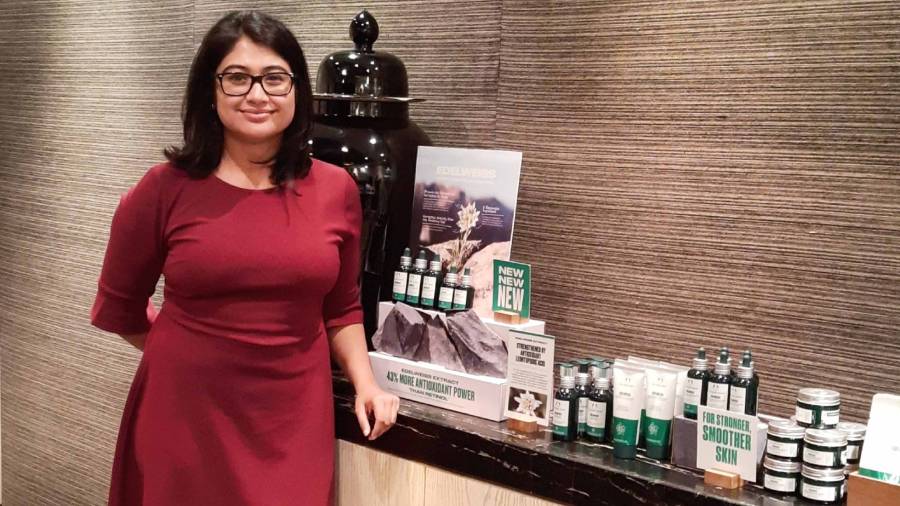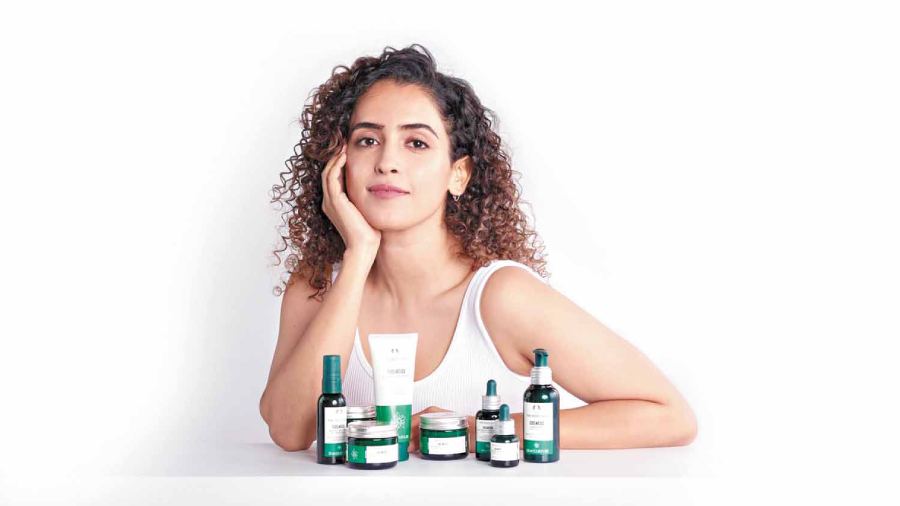I am a very big proponent of what Kolkata and the Eastern India markets are for brands like us that are heavy on skincare,” says Kolkata-bred Antara Kundu, general manager, brand relation, marketing & customer acquisition of The Body Shop, as we start our fluid chat at The Park on September 6. The British cosmetic skincare and perfume company has been avant-garde in skin care with its ingredient-focused, natural extracts, vegan and sustainable values and philosophies. The international beauty retailer giant has already been in India for 17 years and they intend to continue its aggressive retail strategy here. Kundu, an alumna of Modern High School for Girls who has worked with different brands for 14 years, shares The Body Shop’s initiatives to cut down on plastic packaging and their latest range with the game-changing ingredient — Edelweiss. Excerpts:
How were the pandemic years for the brand?
The Body Shop operates on omni-channels. So, before the pandemic struck, we were 70 per cent retail and 30 per cent online and now we are 65 per cent retail and 20 per cent e-commerce and 10-15 are omni-channel. From a business point of view, we had to retool overnight. While a lot of consumer brands had to catch up, our base was already there. We just had to improve our efficiency. And the result was we scaled up from 10k to 30k pin codes. Again, while it was easy to operate in big cities, we needed a new strategy to reach out to customers in the two and three-tier cities. We tied up with local delivery partners and started using one store in the city as a mini warehouse and one centralized number where consumers could call. From two-day delivery, we improved to same-day delivery and by early April 2020, we were up and running.
Apart from that, since we are a human-first business, a lot of investment went into taking care of the people attached to the brand. So, we created a centralized team for employees and staff when the second wave struck; business was not a priority at that time. Personally speaking, I was seven months pregnant when Delta struck and I got all the help and support from the brand. From a business point of view, it made us more agile and adaptive. Now it’s about consolidation and making up for all the lost opportunities. Durga Puja is an important season for us and we are looking forward to it.
The pandemic years also saw a lot of homegrown beauty brands making waves. What are your views on it?
India is one of the most exciting beauty markets in the world. The proliferation of brands on one hand and rapid digitisation on the other have led to this boom. For heritage brands like us, most of it is usually an advantage. These digitally forward brands educate consumers well and beauty is an education-driven segment. So, when a new consumer is educated about beauty my opportunity to sell products increases. The first immediate impact is that the consumer base has expanded; it is very much the case of the rising tide lifting all boats.
Are they not a threat?
I don’t see them as a threat. The reason why the beauty industry is so varied and lucrative in India is that it has space for everyone. Of course, everyone is fighting for the same pie but for a brand like us, the benefits of having a strong homegrown beauty movement outweigh the risks.
The second thing is a lot of these brands are talking of things which are areas of strength for us since 1976. Like natural ingredients, vegan, cruelty-free and plastic positive. Our plastic is recyclable; it comes from our incredible Fair Trade Recycle Plastic Project in India. We work with Plastic for Change in South India and work with waste pickers; all our stores have return-repeat recycle bins. In 2019 when we started this recycled plastic project from Bangalore, we started sourcing 200 tonnes and then the next year we doubled it to 400 tonnes and this plastic is going into the global supply chain. Our end game is to eliminate oil-based plastic by 2025.
A lot of brands are going non-plastic. What steps have The Body shop taken to minimize the use of plastic?
We have a very pragmatic approach to plastic. The right thing to do is say no to single-use plastic but the reality of the situation is, that it is lighter, more affordable and it’s more carbon neutral to produce among other packaging materials, though it causes other problems. We are looking to minimise plastic in our packaging as much as possible. For instance, our new range doesn’t come with second packaging and we have used plastic, aluminium and glass for packaging.
Secondly, we are trying to see plastic as a resource instead of a liability. We are also launching activist stores across India, a more carbon-neutral store where we look forward to using recycled plastic beyond packaging.
The Body shop has always been the frontrunner in campaigns. What are you campaigning for this year?
This year we are pledging to lower the age of candidacy in the Lok Sabha from 25 to 21 years of age.
What are the plans for retail expansion?
We are scaling up our reach and we plan to open three stores per month for a year.

Infocus
Edelweiss is the newest ingredient in focus at The Body Shop this season and the hero component is rare, expensive to source and difficult to harness. Sourced responsibly from the Swiss Alps, the ingredient is a powerhouse of anti-oxidant and fights environmental aggression with better efficiency. “We have clinical proof of its efficacy and consumer of any age and gender can use it,” informs Kundu pointing out that the eye serum and cleaners from the range are already out of stock in Kolkata stores. The range includes sleeping mask, eye concentrate, smoothening day cream, cleanser, daily serum, mists and liquid peel.
Knowmore
- The Body Shop was started by Dame Anita Roddick in Brighton, England
- The Body Shop’s first campaign was on Save the Whale
- For e brief period the company was taken over by L’Oreal
- India is home to The Body Shop’s one and only Fair Trade Recycle Plastic Project
Trends in the cosmetic industry
- Consumers are shifting to more vegan and natural/ organic products than what it was a few years back.
- Offline sales are growing again with a visit to retail stores increasing.
- New-age consumers are very well informed and well educated on the goodness, efficacy and benefits of different natural resources used in beauty and cosmetic products.
- Post-pandemic consumers are focussed on finding the particular products that work for them versus experimenting with skincare. Consumers are switching to a minimal skincare routine.
